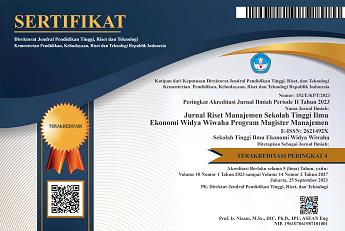PENGARUH KEPEMIMPINAN DISTRIBUTIF, TEAM WORKING , DAN KEPUASAN KERJA TERHADAP KINERJA PERAWAT DI RUMAH SAKIT UMUM DAERAH SUMBAWA NUSA TENGGARA BARAT
DOI:
https://doi.org/10.32477/jrm.v7i1.180Keywords:
Distributive Leadership, Team Work, Job Satisfaction, PerformanceAbstract
Health is a right that must be given by the state to each of its citizens. This has been stated in the 1945 Constitution and Law Number 36 Year 2009 Concerning Health. Nurses as Health Workers in the Hospital become an important factor in supporting optimal health services for patients. The purpose of this study was to analyze both partial and simultaneous influence of distributive leadership, teamwork and job satisfaction on the performance of nurses in RSUD Sumbawa NTB. This study uses quantitative survey methods. The survey was conducted with a questionnaire of 137 nurses in RSUD Sumbawa NTB. Data analysis techniques used are simple regression analysis and multiple regression.The results showed that 1.) Leadership had a positive and significant effect on the performance of nurses in Sumbawa NTB Regional Hospital, 2.) The team worked positively and significantly on the performance of nurses in RSUD Sumbawa NTB, 3.) Positive and significant job satisfaction on Nurse Performance in RSUD Sumbawa NTB, and 4) Simultaneously distributive leadership, teamwork and job satisfaction are significant to the performance of nurses in RSUD Sumbawa NTB.
References
Abu AlRub, R. F. (2004). “Job Stress, Job Performance, and Social Support among Hospital Nurses”. Journal of Nursing Scholarship, 36 (1), 73–78. doi:10.1111/j.1547-5069.2004.04016.x
Al-Homayan, A. M., Shamsudin, F. M., Subramaniam, C., & Islam, R. (2013). “Impacts of job performance level on nurses in public sector hospitals.” American Journal of Applied Sciences, 10(9), 1115.
Leithwood, K. A., Mascall, B., & Strauss, T. (2009). Distributed leadership according to the evidence. New York: Routledge.
Luthans, Fred. (2011). Organizational behavior: an evidence-based approach (12th ed). New York: McGraw-Hill.
Maginn, M. (2004). Making Teams Work: 24 lesson for working together successfully. New York: The McGraw-Hill Companies, Inc.
Martin, G., Beech, N., MacIntosh, R., & Bushfield, S. (2015). “Potential challenges facing distributed leadership in health care: evidence from the UK National Health Service.” Sociology of Health & Illness, 37(1) ISSN 0141- 9889, pp. 14–29.
Miladiyah, N., Mustikasari, M., & Gayatri, D. (2015). “Hubungan Motivasi dan Komitmen Organisasi dengan Kinerja Perawat dalam Pelaksanaan Dokumentasi Asuhan Keperawatan.” Jurnal Keperawatan Indonesia, 18(1), 9–16. doi:10.7454/jki.v18i1.392
Natasia, N., Loekqijana, A., & Kurniawati, J. (2014). “Faktor yang Mempengaruhi Kepatuhan Pelaksanaan SOP Asuhan Keperawatan di ICU-ICCU RSUD Gambiran Kota Kediri.” Jurnal Kedokteran Brawijaya, 28(1), 21-25.
Olsen, E., Bjaalid, G., & Mikkelsen, A. (2017). “Work climate and the mediating role of workplace bullying related to job performance, job satisfaction, and work ability: A study among hospital nurses.” Journal of Advanced Nursing, 73(11), 2709–2719. doi:10.1111/jan.13337
Platis, C., Reklitis, P., & Zimeras, S. (2015). “Relation between job satisfaction and job performance in healthcare services.” Procedia-Social and Behavioral Sciences, 175, 480-487.
Rabindarang, S. & Bing, K.W. (2012). “Kerangka Teoritikal Pengaruh Kepemimpinan Distributif Terhadap Komitmen Organisasi Dan Tekanan Kerja Dalam Organisasi Teknik Dan Vokasional.” Proceedings of 5th UPSI-UPI Conference on Education 2012. Malaysia.
Rabindarang, S., Khuan, W. B., & Khoo, Y. Y. (2014). “Refleksi Tenaga Pengajar Terhadap Kepemimpinan Distributif dan Tekanan Kerja dalam Pendidikan Teknik dan Vokasional.” Akademika, 84(1&2), 17–28. doi:10.17576/akad- 2014-8401n2-02.
Ramasodi, J. M. B. (2010). “Factors influencing job satisfaction among healthcare professionals at South Rand Hospital.” Dissertation, University of Limpopo.
Robbins, S.P., &Judge, T.A. (2013). Organizational behavior 16th ed. Pearson Education, Inc.
Salas, E., Rico, R., & Passmore, J. (2017). The Wiley Blackwell handbook of the psychology of team working and collaborative. John Wiley & Sons Ltd
Thulth, A. S., & Sayej, S. (2015). “Selected Organizational Factors Affecting Performance of Professional Nurses in North West Bank Governmental Hospitals.” Journal of Education and Practice, 6(7), 100-110.
Undang-Undang Nomor 44 tahun 2009 tentang Rumah Sakit
United States Office. (2017). A Handbook for Measuring Employee Performance. OPM.GOV.
Utriainen, K. & Kynga, H. (2009). “Hospital nurses’ job satisfaction: a literature review.” Journal of Nursing Management, 17, 1002–1010
Zensumbawa. (2018). Menuju Standar Nasional, RSUD Sumbawa Dikunjungi Tim SNARS. Diakses pada 30 Agustus 2018, dari http:// www.samawarea.com/2018/07/20/ m enuj u- s tandar - nas i onal- r s udsumbawa- dikunjungi-tim-snars/









